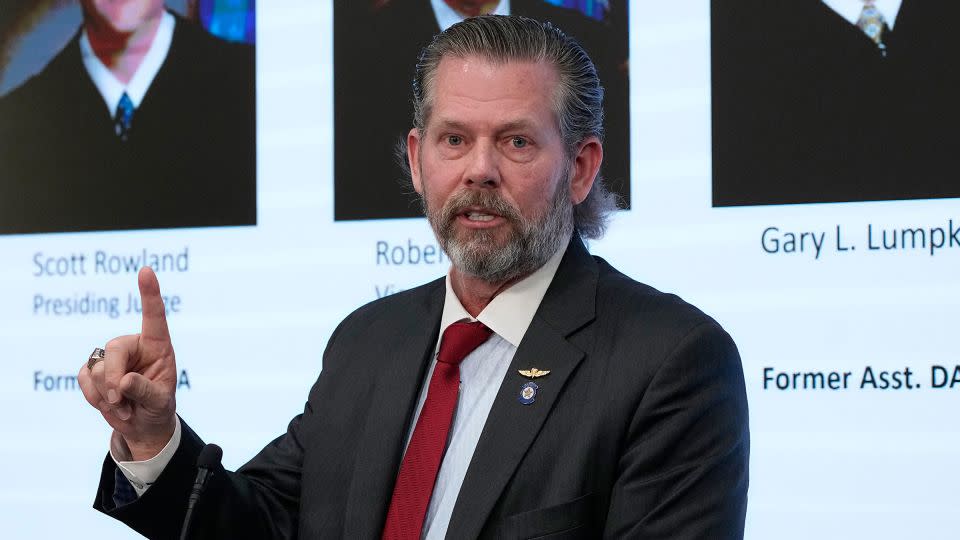What we know about the case of death row inmate Richard Glossip, who says he’s innocent, and the Supreme Court
Oklahoma death row inmate Richard Glossip will finally get the chance to argue for a new trial before the US Supreme Court after insisting for almost three decades he is innocent of the murder for which he was sentenced to die.
The high court this week agreed to take up the inmate’s extraordinary appeal, which is backed even by Oklahoma’s attorney general, a Republican whose support rests on evidence that undermines the credibility of the state’s star witness – the man who killed the victim – and suggests prosecutorial misconduct marred the case. Celebrities including Kim Kardashian also have been among his supporters.
Through it all, Glossip has endured nine execution dates, with each successive one seeming to raise more questions about the fair administration of the death penalty in Oklahoma and beyond.
Glossip “was very excited that the court takes his case very seriously and recognizes the importance of this case and has agreed to hear the case,” his attorney Don Knight told CNN’s Jake Tapper of his client’s reaction to the news. “We’re looking forward to the next phase.”
Glossip’s attorneys have asked the justices to address several questions, including whether the prosecution’s suppression of evidence and its failure to correct false testimony violated Glossip’s right to due process. Additionally, they have asked whether his conviction should be reversed when it is “so infected with errors that the State no longer seeks to defend it.”
Here’s what we know about Glossip’s case:
Convicted of the murder of Barry Van Treese
Glossip’s case dates to January 7, 1997, when Barry Van Treese, a 54-year-old husband and father of seven, was beaten to death at the Oklahoma City motel he owned by a 19-year-old named Justin Sneed, court records state.
Sneed admitted to killing Van Treese. But at trial, prosecutors with the Oklahoma District Attorney’s Office presented the killing as a murder-for-hire plot orchestrated by Glossip, then the motel’s 35-year-old manager whose criminal record, per his attorneys, consisted of a single traffic ticket. In exchange for a guilty plea and his testimony against Glossip, Sneed got a life sentence to avoid the death penalty.
Glossip was arrested two days after Van Treese’s killing and initially charged with accessory to murder. The charge was later upgraded to first-degree murder, court records show.
Glossip was convicted and sentenced to death in 1998, but that initial outcome was overturned on appeal due to ineffective counsel. He was retried again in 2004, and he was again convicted – and sentenced to die.

2 investigations cast uncertainty on his guilt
Glossip has always maintained his innocence, saying he was not involved in Van Treese’s murder. And while two independent reviews in recent years stopped short of declaring him innocent, they raised significant doubts about his purported guilt and the way prosecutors secured his conviction.
The first review was done at the request of Oklahoma legislators by the law firm Reed Smith, which released its findings in a 343-page report in June 2022.
Months of pro bono inquiry “revealed the state’s intentional destruction of evidence before” Glossip’s second trial, the firm said – namely a box containing financial records Reed Smith’s report said were needed to disprove prosecutors’ theory that Glossip was motivated to kill Van Treese because he was embezzling money from the motel.
Prosecutors were aware of the destruction of evidence, Reed Smith’s report said, describing it as a “complete breakdown in our criminal justice system.”
Additionally, Sneed’s testimony – the state’s “sole evidence” of Glossip’s involvement – was tainted, Reed Smith concluded. Sneed only implicated Glossip after detectives mentioned the latter’s name six times during Sneed’s interrogation, offering a “life line” to a man facing a first-degree murder charge, the law firm’s report said.
A supplement to Reed Smith’s report later included Sneed’s statements indicating he wanted to recant his testimony, including a 2007 letter in which Sneed wrote to his attorney, “There are a lot of things right now that are eating at me,” and, “I think you know were (sic) I’m going it was a mistake.”

The second review was undertaken by GOP Oklahoma Attorney General Gentner Drummond after he took office in January 2023. He commissioned an independent counsel who ultimately decided a motion to vacate Glossip’s conviction and a new trial were appropriate.
That decision was based on findings, including that prosecutors had withheld evidence from Glossip and his attorneys – a so-called Brady violation.
Upon getting access to those files last January, Glossip’s attorneys say they found evidence Sneed told prosecutors he was under the care of a jail psychiatrist who had diagnosed him with bipolar disorder and prescribed him lithium. The doctor also believed Sneed’s methamphetamine use could have made him “potentially violent.”
But at Glossip’s second trial, under questioning by prosecutors, Sneed said he had never seen a psychiatrist and suggested the lithium was prescribed after he asked for Sudafed to treat a cold, court records show. The state did not contradict him.
Glossip has a deep bench of supporters
Glossip has gained many allies in the intervening years, including celebrities like Kardashian and a bipartisan group of Oklahoma state legislators – the loudest of whom are Republicans who support the death penalty but question its staying power if Glossip is executed.
Still, Glossip has remained on death row, each apparent moment of vindication seemingly followed by a setback that ensures his continued imprisonment and one execution date after another – the most recent of which was May 18.
Based on the independent counsel’s findings, the attorney general filed a motion in early April with the Oklahoma Court of Criminal Appeals to vacate Glossip’s conviction, saying in a statement he “cannot stand behind the murder conviction and death sentence of Richard Glossip.”
“This is not to say I believe he is innocent,” Drummond said. “However, it is critical that Oklahomans have absolute faith that the death penalty is administered fairly and with certainty. Considering everything I know about this case, I do not believe that justice is served by executing a man based on the testimony of a compromised witness.”

The backing of the state’s chief law enforcement officer was a significant boon for Glossip. But two weeks later, the appeals court denied Glossip’s appeal in a 5-0 vote less than a month before Glossip’s next-scheduled execution.
Glossip pleaded his case for clemency days later before the state’s Pardons and Parole Board, where Drummond – in another unusual step – testified on Glossip’s behalf. Again, he lost: The board voted 2-2 with one recusal, resulting in a denial of recommendation of clemency and again setting the stage for his execution.
That same day, Glossip’s attorneys petitioned the US Supreme Court for a stay of execution and to hear his case. The state indicated in its own filing it supported Glossip’s request.
Then, on May 5, the Supreme Court issued a stay while the justices considered whether to review his case. They ultimately agreed this week, setting the stage for Glossip’s attorney to argue his case later this year.
The victim’s family supports his execution
It should be noted that Van Treese’s family rejects Glossip’s innocence claims and believes his execution should move ahead.
At last year’s parole board hearing, the victim’s family stood alone in testifying against clemency, pleading for justice to be done after so many years.
“In that time the state of Oklahoma has had four governors, five attorneys general, seven directors of the Department of Corrections,” said Van Treese’s son, Derek Van Treese. After numerous appeals and reviews, the case has “been pushed from the court of law to the court of public opinion,” he said.
“Enough is enough,” Van Treese said. “The time is now. I urge you, I beg you to allow justice to finally be served through the word of law and the will of the people by denying clemency.”
For more CNN news and newsletters create an account at CNN.com


